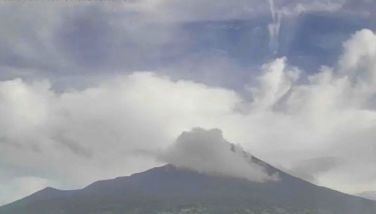AFP eyes Christmas truce
December 18, 2005 | 12:00am
The Armed Forces of the Philippines (AFP) is studying proposals for a "short term" truce with the communist New People’s Army (NPA) during the holidays.
The proposals came amid earlier pronouncements by the military that a unilateral military ceasefire during the Christmas season would only give the communist guerrillas an opportunity to regroup.
AFP deputy chief of staff and spokesman Lt. Gen. Samuel Bagasin said they have yet to endorse the plan or declare any truce with the communists.
And if it does happen, any truce proposal with the NPA would be shortened to "a day or two," Bagasin said.
"But we have not made an official endorsement (yet)," he added.
Bagasin stressed any decision to declare a ceasefire with the NPA will emanate from Malacañang.
Last year, the government declared a unilateral 21-day Christmas ceasefire but NPA rebels continued to sustain their offensives in the countryside.
In previous years, the AFP usually declared a 10-day unilateral ceasefire that ran from Dec. 27 to Jan. 5.
On the other hand, the NPA declares its own version of the truce that usually starts on Dec. 17 and runs to Dec. 26.
Army chief Lt. Gen. Hermogenes Esperon had earlier issued a statement thay a government truce declaration would be a useless exercise.
He pointed out that rebels could just use the truce period to regroup and rearm themselves.
Esperon has been among the ranking officials in the military opposed to any truce with the NPA rebels.
Bagasin, for his part, supported Esperon’s position. He pointed out the AFP had already taken initiatives against the rebels and a ceasefire would be a tactical disadvantage for the troops.
As Christmas Day approaches, three soldiers and two Army officers were waylaid by NPA rebels in Tuluna, North Cotabato on Friday, he pointed out.
"If you ask us, we want to continue with our pursuit operations," Bagasin said.
After the government declared a ceasefire last year, NPA rebels attacked a town hall in Nueva Ecija.
The communist negotiating arm, the National Democratic Front (NDF), earlier rejected peace talks in the Netherlands, accusing the Philippine government of not doing enough to persuade the US and other foreign governments to remove them from their list of Foreign Terrorist Organizations (FTOs).
Despite the repeated suspension of peace negotiations, the Philippine government has traditionally observed Christmas truces in the past, which the NPA often reciprocated.
The unilateral truce as declared by the government was seen as a confidence-building measure in pursuit of peace negotiations with the communist rebels.
But the communists still consider a Christmas truce a sort of "tricky psywar (psychological war)" effort.
Lawmakers expressed support for efforts to forge a permanent ceasefire with the communists but pointed out the long-festering insurgency problem can only be resolved through sincerity and determination on both sides.
The 8,000-strong NPA has been waging an insurgency for 35 years. The conflict has killed 40,000 people, deterred investment and stunted rural development in one of Southeast Asia’s poorest countries.
Many senior rebel leaders led by Jose Ma. Sison, founder of the Communist Party of the Philippines (CPP) live in exile in the Netherlands.
Sison has demanded the Philippine government work toward removing the terror label placed on his group by the US and the 15-nation European Union as a prerequisite for the peace talks to continue.
The US State Department put the CPP, NPA, and the NDF on its FTO blacklist after the Sept. 11, 2001 attacks.
The proposals came amid earlier pronouncements by the military that a unilateral military ceasefire during the Christmas season would only give the communist guerrillas an opportunity to regroup.
AFP deputy chief of staff and spokesman Lt. Gen. Samuel Bagasin said they have yet to endorse the plan or declare any truce with the communists.
And if it does happen, any truce proposal with the NPA would be shortened to "a day or two," Bagasin said.
"But we have not made an official endorsement (yet)," he added.
Bagasin stressed any decision to declare a ceasefire with the NPA will emanate from Malacañang.
Last year, the government declared a unilateral 21-day Christmas ceasefire but NPA rebels continued to sustain their offensives in the countryside.
In previous years, the AFP usually declared a 10-day unilateral ceasefire that ran from Dec. 27 to Jan. 5.
On the other hand, the NPA declares its own version of the truce that usually starts on Dec. 17 and runs to Dec. 26.
Army chief Lt. Gen. Hermogenes Esperon had earlier issued a statement thay a government truce declaration would be a useless exercise.
He pointed out that rebels could just use the truce period to regroup and rearm themselves.
Esperon has been among the ranking officials in the military opposed to any truce with the NPA rebels.
Bagasin, for his part, supported Esperon’s position. He pointed out the AFP had already taken initiatives against the rebels and a ceasefire would be a tactical disadvantage for the troops.
As Christmas Day approaches, three soldiers and two Army officers were waylaid by NPA rebels in Tuluna, North Cotabato on Friday, he pointed out.
"If you ask us, we want to continue with our pursuit operations," Bagasin said.
After the government declared a ceasefire last year, NPA rebels attacked a town hall in Nueva Ecija.
The communist negotiating arm, the National Democratic Front (NDF), earlier rejected peace talks in the Netherlands, accusing the Philippine government of not doing enough to persuade the US and other foreign governments to remove them from their list of Foreign Terrorist Organizations (FTOs).
Despite the repeated suspension of peace negotiations, the Philippine government has traditionally observed Christmas truces in the past, which the NPA often reciprocated.
The unilateral truce as declared by the government was seen as a confidence-building measure in pursuit of peace negotiations with the communist rebels.
But the communists still consider a Christmas truce a sort of "tricky psywar (psychological war)" effort.
Lawmakers expressed support for efforts to forge a permanent ceasefire with the communists but pointed out the long-festering insurgency problem can only be resolved through sincerity and determination on both sides.
The 8,000-strong NPA has been waging an insurgency for 35 years. The conflict has killed 40,000 people, deterred investment and stunted rural development in one of Southeast Asia’s poorest countries.
Many senior rebel leaders led by Jose Ma. Sison, founder of the Communist Party of the Philippines (CPP) live in exile in the Netherlands.
Sison has demanded the Philippine government work toward removing the terror label placed on his group by the US and the 15-nation European Union as a prerequisite for the peace talks to continue.
The US State Department put the CPP, NPA, and the NDF on its FTO blacklist after the Sept. 11, 2001 attacks.
BrandSpace Articles
<
>
- Latest
- Trending
Trending
Latest
Trending
Latest
Recommended





























